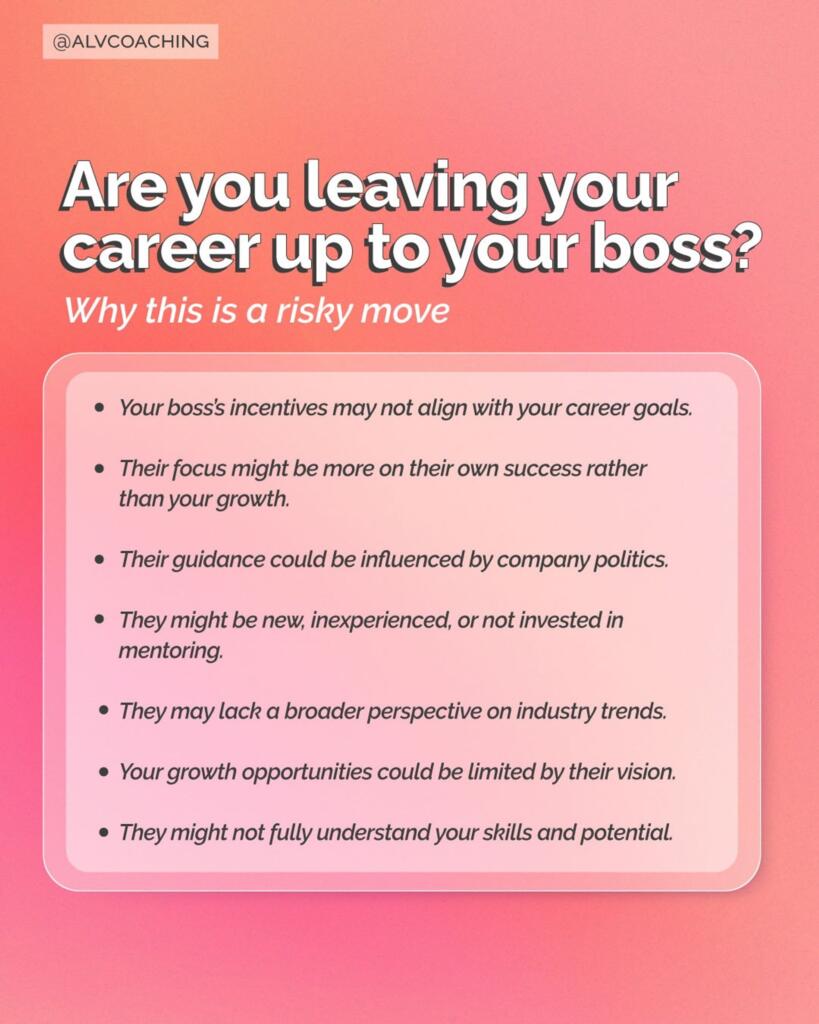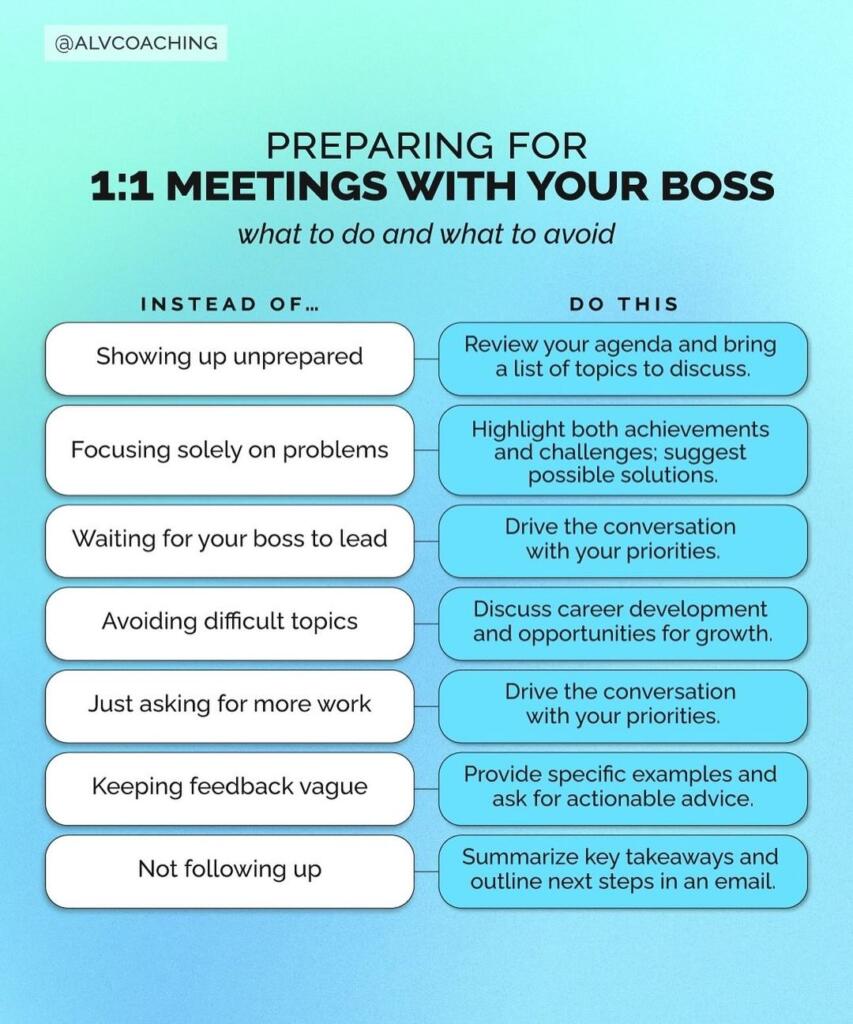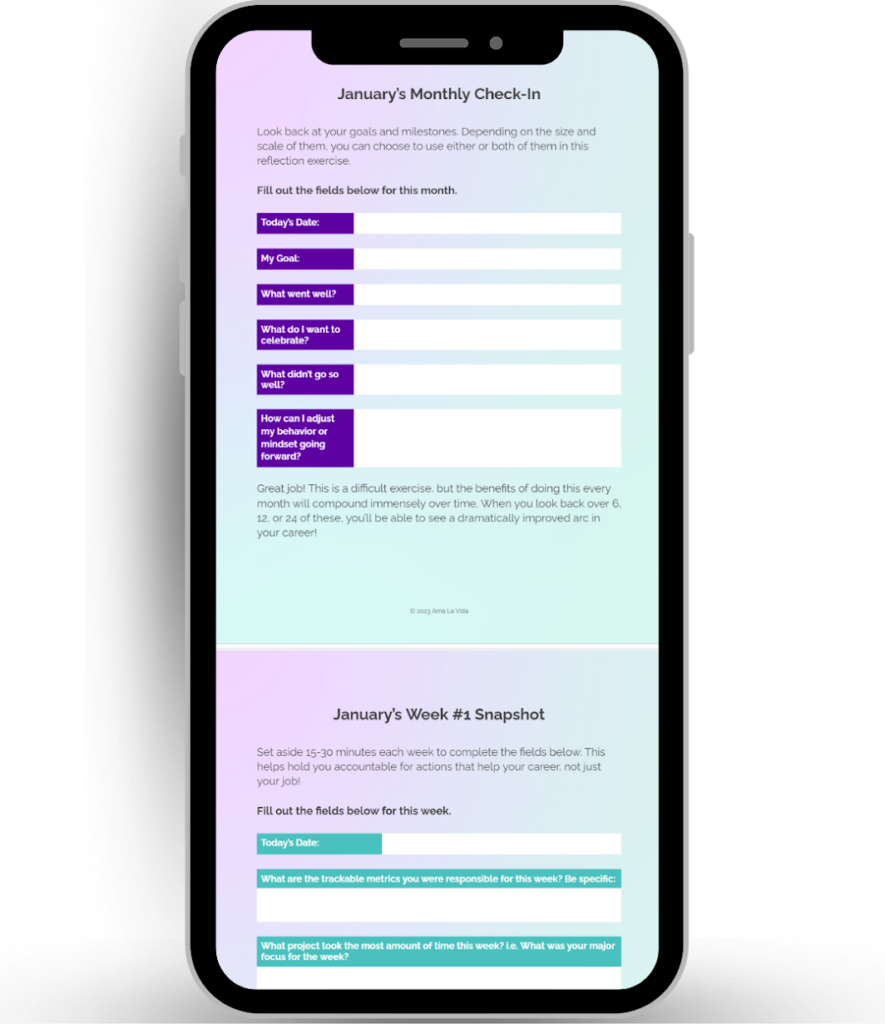5 Steps To Take Ownership Of Your Career

Most of us entered the workforce thinking that just putting our heads down and doing the work would get us noticed and promoted.
Fast forward a few years, we find ourselves in a work environment that is not inspiring, fulfilling, or (even worse) meeting our financial needs!
The Big Lie about career success
Even though times are changing, many companies are still not explicitly encouraging employees to be proactive in taking ownership of your career at work. The reality is, as an employee, it is no one’s job but your own to ensure your needs are met.
The key to finding success in your career is letting go of the idea that someone is coming in to save you. Yes, there are employees who get lucky with wonderful bosses who support and advocate for them. But the reality is, if you’re waiting for the perfect manager, you’re putting your fate in someone else’s hands.

Whether you’re seeking a leadership role, looking for more autonomy, hoping to work on a dream project, or maybe even just looking for a better work-life balance, taking ownership for your own success at work is crucial.
By taking ownership of your own career progression, you can break out of this cycle and create real change.
Why is taking ownership of your career path important?
The reality is, if you’re leaving your fate in the hands of a manager, you’re at risk. You might not get the promotion you’ve been working toward for years. You might get laid off with no prospects on the horizon (as so many job seekers are experiencing these days!). You might just end up hating your job with no way out.
So many employees think this is the only way to move through their careers, but the reality is you can take ownership of your work experience, and at the end of the day, you are the only one with responsibility for your own success.
By taking ownership of your work, you can become accountable for achieving your career goals and also potentially instigate change within the culture of your organization.
What ownership looks like at work
Taking ownership at work goes beyond just managing your projects proactively and problem-solving effectively.
Instead, when you have true ownership of your full career you have options and control over your work-life, rather than feeling stuck if your job goes south (or away!).
To take ownership is to know:
- What you want out of your career
- What type of work you do best
- How you like to work
And then setting goals and systems to move you in the direction of those things.
So, how do you take ownership of your career?
It can seem overwhelming, but taking ownership of your career is absolutely possible. With the right strategies, you can take control of your professional life. Here are five steps you can take to assume responsibility for your work trajectory and build a job you love.
1. Craft your career vision
The very first step to taking ownership of your career is to define what success would look like for you.
Remember that work is a resource to serve your life, not the other way around. Having a clear perspective on what success means to you is the foundation for setting professional goals that align with your personal values and ambitions.
Consider the bigger picture, think beyond just your job title or salary, and instead consider the impact you want to have on your industry, your community, or even the world.
Set aside time to develop a sense of what matters most to you in life, how you want to contribute, and what you want to achieve. Then write it down.
2. Create alignment between your behavior and your vision
Once you have a clear understanding of your personal vision for success, the next step is to bring your job into alignment with your goals. Here are a few ways to bring your job into alignment with where you’re going:
Job crafting
Even if your current job role doesn’t necessarily match your dream, it doesn’t mean you need to quit. Consider job crafting, where you and your manager redesign your job responsibilities to better align with your strengths and interests.
It’s true—bringing your job into alignment with your vision for success will require good communication with your manager, and even your teammates or direct reports.
While it’s important to be respectful of company goals and culture, you can also discuss how gaining additional experience in certain areas can benefit both you and the organization.
This might include new projects, new job roles, and (hopefully!) more growth opportunities for you! Many companies are excited at the prospect of employees taking ownership at work because it often means that their employees feel empowered and will do great work, rather than just the bare minimum.
Setting boundaries
Too often we see employees who are burned out, miserable and deeply frustrated with their company culture—only to realize that they are part of the problem! This isn’t to take accountability away from a bad boss or toxic workplace, but setting boundaries can go a long way.
Setting boundaries is about establishing clear guidelines for how you want to be treated, when and how you’re willing to work or what tasks you are willing to take on—and establishing how you will enforce them.
If you’re establishing new boundaries, it’s important to communicate these to your manager to get buy-in and ask for support in maintaining them. By having open and honest communication with your manager, you can work together to find a solution that meets both your needs and the company’s goals.
Honoring your own boundaries is essential to avoid burnout and ensure that you are making progress toward your bigger-picture goals.
3. Show up (authentically) as your personal brand
As you bring your current job into alignment with the long-term vision for what you want to achieve at work, it’s important to continue showing up in a way that supports your future vision—so let’s break it down for you!
Many people believe that a personal brand is a catchy tagline or a polished online presence. While those things are certainly part of it, a personal brand goes much deeper than that. The process of building a personal brand is much broader than just updating your LinkedIn profile and posting on social media.
Your personal brand is a reflection of who you are, what you stand for, and what you bring to the table professionally. It’s not just about your skills and experience, but also your values, personality, and unique strengths.
By creating a strong personal brand, you’re telling the world what you’re all about and what you have to offer.
It’s not just about standing out, but also about building trust and credibility with your colleagues, clients, and stakeholders. By focusing on both internal and external networking opportunities, you can establish yourself as an expert in your field and create valuable connections that can help you reach your career goals.
Showing up authentically at work
Don’t overlook opportunities to build your network in your current organization. It’s a key part of making the most of your current job. As your team, company leadership, clients and even vendor partners work with you on a daily basis, they’re forming an impression of what it’s like to work with you that they will remember for years to come.
How you show up in team meetings, present new ideas, resolve issues, and complete tasks all showcase your skills and strengths to the people around you.
When you make an effort to show initiative, you set yourself apart from others, give those around you a sense of who you are, and become known as a valuable asset to other employees, the organization, and everyone else you may work with.
Managing your reputation
Let’s face it, what people at work think of you matters. Reputation management involves taking ownership and responsibility for how you are perceived by others, both inside and outside the company. This includes identifying areas where you can improve, seeking feedback from colleagues and supervisors, and actively working to address any issues or concerns.
Being accountable for how others view you and taking steps to manage your reputation as an employee is an essential part of actively managing your career and moving forward toward your professional goals.
Showing up outside your organization
Yes, networking is still an important skill you need to reach your career goals. As you think about taking ownership of your career fulfillment, having connections and insights beyond the people you work with every day will be important.
Remember, networking isn’t just about getting a new job or collecting business cards like Pokemon.

Instead, it’s a way to build real connections and even give you ideas that you can implement at work to help reach company goals. When companies talk about employee ownership, often this is what taking ownership means to them!
Take the time to intentionally expand your network, stay apprised of relevant trends and opportunities, and build processes to keep a pulse on your environment.
4. Be proactive
Don’t just wait for when your company does performance reviews to think about your career goals! You can take ownership of your long-term success by identifying areas where you can grow and taking responsibility for moving forward.
Seeking constructive feedback and educational resources can also help you develop a sense of confidence in taking on additional responsibilities and more initiative in problem-solving. Both of these can help you be seen as a business leader.
People who find themselves in careers they love don’t wait for opportunities to come to them, but instead create them for themselves. While companies may not outwardly encourage employees, it’s still crucial to make sure your skill set never becomes stale, and that you are engaged in ongoing growth and personal development.
Setting goals to build your skills
You can work with your manager or on your own to identify specific tasks and opportunities to develop the skills you’ll need to reach your short-term and long-term career goals, and then seek out educational resources and training opportunities within your company or industry to stay current and expand your skill set. By doing this, you can demonstrate your commitment to growth and development within your workplace, and position yourself for success both now and in the future.
Tracking your wins
Keeping track of your work each week will help you stay focused on what matters and make progress toward your goals.
We recommend all our members create a monthly check-in or a weekly snapshot for themselves, both of which can help you track progress toward your goals, measure important metrics of success, and also identify areas for improvement.
If you want to start this process, you can download our Brag Book template for free right here!
5. Advocate for yourself
Advocating for yourself is the last piece of taking ownership of your professional path. You can’t just sit back and hope leadership knows that you want a promotion, to work fewer hours, or to work on a cool new project. Having a clear plan in place can help ensure that you are both on the same page and working toward a shared vision.
Instead, take accountability for your own happiness is by meeting with your manager to discuss your goals and how you can work together to reach them. More often than not, managers appreciate it when their employees take the initiative.

A good manager wants to see their team take ownership of their professional goals and encourages employees to share their ideas of what work will be meaningful to them.
If your boss isn’t supportive or receptive to hearing your goals, connect with those outside your team who can help advocate on your behalf.
At the end of the day, advocating for yourself is about taking responsibility for your own career trajectory and actively working toward the outcomes you desire. By setting clear goals, communicating your needs and boundaries, and building meaningful relationships with advocates, you can create a strong foundation for success and fulfillment in your career.
Now go do it!
Taking ownership is essential for your professional and personal growth. By creating your vision of success, bringing your job into alignment with what you want, showing up, being proactive, and advocating for yourself, you can create a work environment that is fulfilling and serves your personal and professional growth.
It can be challenging to navigate the complexities of the workplace, which is why working with a career coach can be a game-changer. They can help you develop a career plan, provide guidance on how to take ownership of your career path, and keep you accountable for achieving your goals.
Ready to learn more? Book a free call to learn more and get matched with a coach.









